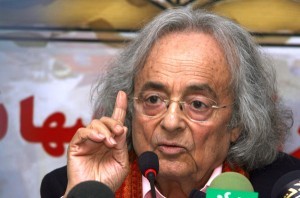A Letter to Syrian Poet Adonis

Adonis has repeatedly written about the Syrian revolution; in the letter he addressed to President Bashar al-Assad, for example, or his column in the daily Al-Hayat, and he has spoken about it in interviews with both television and print media. In all of his statements, Adonis has shown disrespect for the Syrians’ blood and accused the revolution of being “religious and sectarian”. The following is a response to Adonis’s account of the revolution and a clarification about its true nature.
Dear Mr Adonis,
I hope this message finds you well.
Dear sir, you have written that the geographical scope of the Syrian revolution is limited. This is not true. The revolution spreads over the entire map of Syria, without exception; it is manifest in hundreds of locations that are filmed and documented on a daily basis.
As for the rise of the Islamists, which has been a favorite subject for critics, it was the current regime that provided a favourable environment for this by spreading poverty and ignorance, as well as resorting to repression and forbidding any political activity whatsoever.
Dear Mr Adonis,
The Syrian revolution is not sectarian. I am convinced that only someone with sectarian leanings would see the revolution as sectarian. People see things the way they are themselves and according to their own whims. Since the start of the revolution, the regime has tried to drag people into sectarianism through killings at the hands of its shabiha thugs. The regime has even leaked videos of its supporters and shabiha cursing and committing heinous acts in order to push people into reactions that are sectarian in nature. In spite of that, the Syrian street has remained unaffected by these attempts; Syrians have borne their wounds and moved on to offer up more martyrs without resorting to sectarian retaliation. But the regime’s own response to the Syrian people’s civilised attitude in Homs, Hama, Damascus, alongside other cities, was more atrocious massacres.
Had you been concerned about the Syrian people and the revolution, Mr Adonis, you would have pointed your finger at the side that has used sectarianism to set the country on fire to remain in power. You only had to refer to the statement of the three Alawite clerics in Homs in order to have a clear picture of the situation; these clerics’ reading of the current events was sober and accurate. You also could have read the statement of the Syrian Alawite intellectuals, signed by Syrians from all backgrounds. It is a superb statement coming from figures who acquired their sectarian affiliation through birth, not a sense of tribalism. This statement is patriotic, civilised and fair, and viewed things as they are.
If sectarian voices exist at all, they are limited and do not represent the Syrian revolution, and in most cases, one could find political ties between them and the regime. Whether or not they realise it, they serve this regime.
The battle, today, is being fought on the one hand between the people who have risen to retrieve their lost dignity, freedom and livelihood, and on the other a regime that has used repression and terrorism and is holding on to the power it has usurped. This battle is not only fought on the ground; it is also taking place in the spheres of media, culture and consciousness.
The majority of Syrian intellectuals have sided with the revolution. An intellectual represents the people’s conscience and reflects the beautiful and humane sides of culture – any culture. I am certain that the true intellectuals are those who take the side of their people. I cannot imagine that any “intellectual” could support tyrants.
Finally, allow me to express my surprise at this position, which was taken by someone who, in the prime of his life, used to theorise in favor of an Arab literary and intellectual revolution headed by modernising Arab poets. How could this person not be a moderniser or revolutionary when it comes to saving society from a nightmare that has haunted it for more than four decades?
Sincerely yours,
Firas Saad
Syrian author
